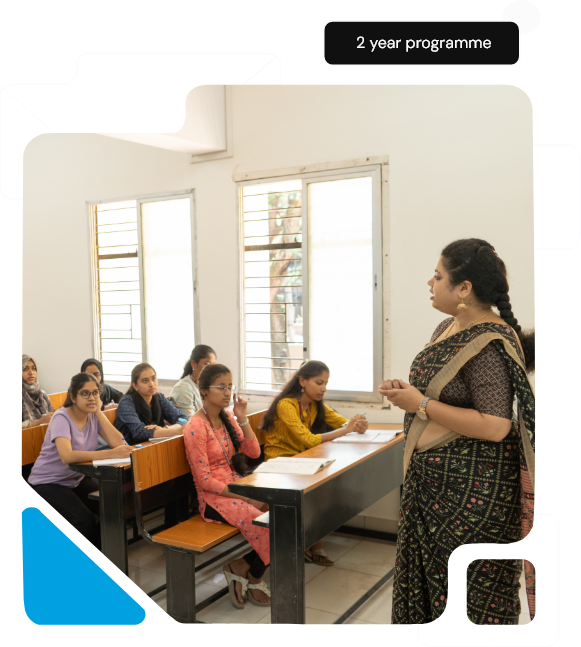Commerce Decoded Programme

Combinations Available
- Business Studies | Accountancy | Basic Mathematics | Statistics
- Business Studies | Accountancy | Basic Mathematics | Economics
- English and Sanskrit | Kannada | Hindi | French


Commerce Decoded programme

Combinations Available
- Business Studies | Accountancy | Basic Mathematics | Statistics
- Business Studies | Accountancy | Basic Mathematics | Economics
- English and Sanskrit | Kannada | Hindi | French
FEATURES
It is a 2-year PU course with the following salient features:
- The complete PU syllabus will be covered with innovative techniques and methodologies for better understanding
- CA Foundation, CLAT and IPMAR
- Computer Certification Course
- Business and Entrepreneurship Training
- Personality Development Course
- Guest lectures by CA/CS/UPSC/Stock Market Experts/Startup Founders/Entrepreneurs
- Student Exchange Programmes with foreign universities and Study Tours (additional cost)
Brief on CA
CA Foundation classes are preparatory courses designed to help students succeed in the CA Foundation exam, which is the entry-level examination for the Chartered Accountancy courses in India. Various coaching institutions offer these classes, which typically cover the syllabus outlined by the Institute of Chartered Accountants of India (ICAI).
Subjects Covered in CA Foundation
- Principles and Practice of Accounting (Paper 1)
- Business Law and Business Correspondence & Reporting (Paper 2)
- Part A: Business Law
- Part B: Business Correspondence and Reporting Business Mathematics,
- Logical Reasoning, and Statistics (Paper 3)
- Business Economics and Business & Commercial Knowledge (Paper 4)
- Part A: Business Economics
- Part B: Business and Commercial Knowledge
Brief on CLAT
The Common Law Admission Test (CLAT) is a national-level entrance examination in India, conducted for admission into undergraduate (UG) and postgraduate (PG) law programmes offered by 22 National Law Universities (NLUs) and several other private law colleges.
Importance of CA
CLAT is the gateway to some of the most prestigious law institutions in India, offering career opportunities in corporate law, litigation, academia, judicial services and more.
Particulars
CLAT
Conducting Body
The exam is organised by the Consortium of National Law Universities (CNLU) - a group of 26 NLUs. The consortium also handles the admission process and counselling.
Conducting Body
Educational Qualification: Candidates must have passed Class-12 or equivalent from a recognised board. Minimum Marks: General/OBC: 45%, SC/ST: 40% No upper age limit
Exam Pattern
The exam primarily tests reading and reasoning skills through a comprehension-based approach.
Duration: 2 hours
Type of Questions: Multiple-choice questions (MCQs)
Total Marks: 150
Sections
English Language: Reading comprehension, grammar and vocabulary
Current Affairs including General Knowledge: National and international events, awards, sports, etc
Legal Reasoning: Principles of law, hypothetical scenarios and logical reasoning
Logical Reasoning: Analytical and critical reasoning skills
Quantitative Techniques: Basic math (up to Class-10 level) and data interpretation
Marking Scheme
+1 for every correct answer and -0.25 for every incorrect answer
Selection Process
Merit-Based Admission: Based on the CLAT score Counselling: Conducted by the CNLU for seat allocation across NLUs
Brief on IPMAT
The Integrated Programme in Management Aptitude Test (IPMAT) is a national-level entrance exam, conducted in India to gain admission into the five-year Integrated Programme in Management (IPM), offered by prestigious institutions like IIM Indore, IIM Rohtak, etc.
Importance of CA
The IPM is a unique programme that blends undergraduate and postgraduate management education. After three years of foundational studies, students directly transition into an MBA programme, saving time and offering early exposure to management education.
Particulars
IPMAT
Conducting Body
IIM Indore is one of the pioneers of the IPM programme and the main institution associated with the IPMAT.
Conducting Body
Educational Qualification: Candidates must have passed, or, must be appearing for their Class-12 or equivalent exam. Age Limit: Generally, candidates must be below 20 years of age as of July 31st, in the year of admission (relaxation for reserved categories may apply).
Exam Pattern
The exam primarily tests Quantitative Ability & Verbal Ability through a comprehension-based approach.
Duration: 2 hours
Type of Questions: Multiple-choice questions (MCQs) & Short Answers
Total Marks: 400
Sections
Quantitative Ability (MCQs): Math-based questions
Quantitative Ability (Short Answers): Non-MCQ math-based questions requiring detailed solutions
Verbal Ability (MCQs): English grammar, comprehension, vocabulary, etc
Marking Scheme
+4 for every correct answer and -1 for every incorrect answer
Selection Process
Merit-Based Admission: Based on the IPMAT score Counselling: Conducted by the IIM-Indore
Brief on CLAT
The Common Law Admission Test (CLAT) is a national-level entrance examination in India, conducted for admission into undergraduate (UG) and postgraduate (PG) law programmes offered by 22 National Law Universities (NLUs) and several other private law colleges.
Importance of CLAT
CLAT is the gateway to some of the most prestigious law institutions in India, offering career opportunities in corporate law, litigation, academia, judicial services and more.
Particulars
CLAT
Conducting Body
The exam is organised by the Consortium of National Law Universities (CNLU) - a group of 26 NLUs. The consortium also handles the admission process and counselling.
Eligibility Criteria
Educational Qualification: Candidates must have passed Class-12 or equivalent from a recognised board. Minimum Marks: General/OBC: 45%, SC/ST: 40% No upper age limit
Exam Pattern
The exam primarily tests reading and reasoning skills through a comprehension-based approach.
Duration: 2 hours
Type of Questions: Multiple-choice questions (MCQs)
Total Marks: 150
Sections
English Language: Reading comprehension, grammar and vocabulary
Current Affairs including General Knowledge: National and international events, awards, sports, etc
Legal Reasoning: Principles of law, hypothetical scenarios and logical reasoning
Logical Reasoning: Analytical and critical reasoning skills
Quantitative Techniques: Basic math (up to Class-10 level) and data interpretation
Marking Scheme
+1 for every correct answer and -0.25 for every incorrect answer
Selection Process
Merit-Based Admission: Based on the CLAT score Counselling: Conducted by the CNLU for seat allocation across NLUs
Brief on IPMAT
The Integrated Programme in Management Aptitude Test (IPMAT) is a national-level entrance exam, conducted in India to gain admission into the five-year Integrated Programme in Management (IPM), offered by prestigious institutions like IIM Indore, IIM Rohtak, etc.
Importance of IPMAT
The IPM is a unique programme that blends undergraduate and postgraduate management education. After three years of foundational studies, students directly transition into an MBA programme, saving time and offering early exposure to management education.
Particulars
IPMAT
Conducting Body
IIM Indore is one of the pioneers of the IPM programme and the main institution associated with the IPMAT.
Eligibility Criteria
Educational Qualification: Candidates must have passed, or, must be appearing for their Class-12 or equivalent exam. Age Limit: Generally, candidates must be below 20 years of age as of July 31st, in the year of admission (relaxation for reserved categories may apply).
Exam Pattern
The exam primarily tests Quantitative Ability & Verbal Ability through a comprehension-based approach.
Duration: 2 hours
Type of Questions: Multiple-choice questions (MCQs) & Short Answers
Total Marks: 400
Sections
Quantitative Ability (MCQs): Math-based questions
Quantitative Ability (Short Answers): Non-MCQ math-based questions requiring detailed solutions
Verbal Ability (MCQs): English grammar, comprehension, vocabulary, etc
Marking Scheme
+4 for every correct answer and -1 for every incorrect answer
Selection Process
Merit-Based Admission: Based on the IPMAT score Counselling: Conducted by the IIM-Indore
Brief on CLAT
The Common Law Admission Test (CLAT) is a national-level entrance examination in India, conducted for admission into undergraduate (UG) and postgraduate (PG) law programmes offered by 22 National Law Universities (NLUs) and several other private law colleges.
Importance of CLAT
CLAT is the gateway to some of the most prestigious law institutions in India, offering career opportunities in corporate law, litigation, academia, judicial services and more.
Particulars
CLAT
Conducting Body
The exam is organised by the Consortium of National Law Universities (CNLU) - a group of 26 NLUs. The consortium also handles the admission process and counselling.
Eligibility Criteria
Educational Qualification: Candidates must have passed Class-12 or equivalent from a recognised board. Minimum Marks: General/OBC: 45%, SC/ST: 40% No upper age limit
Exam Pattern
The exam primarily tests reading and reasoning skills through a comprehension-based approach.
Duration: 2 hours
Type of Questions: Multiple-choice questions (MCQs)
Total Marks: 150
Sections
English Language: Reading comprehension, grammar and vocabulary
Current Affairs including General Knowledge: National and international events, awards, sports, etc
Legal Reasoning: Principles of law, hypothetical scenarios and logical reasoning
Logical Reasoning: Analytical and critical reasoning skills
Quantitative Techniques: Basic math (up to Class-10 level) and data interpretation
Marking Scheme
+1 for every correct answer and -0.25 for every incorrect answer
Selection Process
Merit-Based Admission: Based on the CLAT score Counselling: Conducted by the CNLU for seat allocation across NLUs
Consectetur adipisicing elit, sed do eiusmod tempor incididunt ut labore et dolore magna aliqua. Ut enim ad minim veniam, quis nostrud exercitation ullamco laboris nisi ut aliquip ex ea commodo consequat. Duis aute irure dolor in reprehenderit in voluptate velit esse cillum dolore eu fugiat nulla pariatur. Excepteur sint occaecat cupidatat non proident, sunt in culpa qui officia deserunt mollit anim id est laborum. Sed ut perspiciatis unde omnis iste
